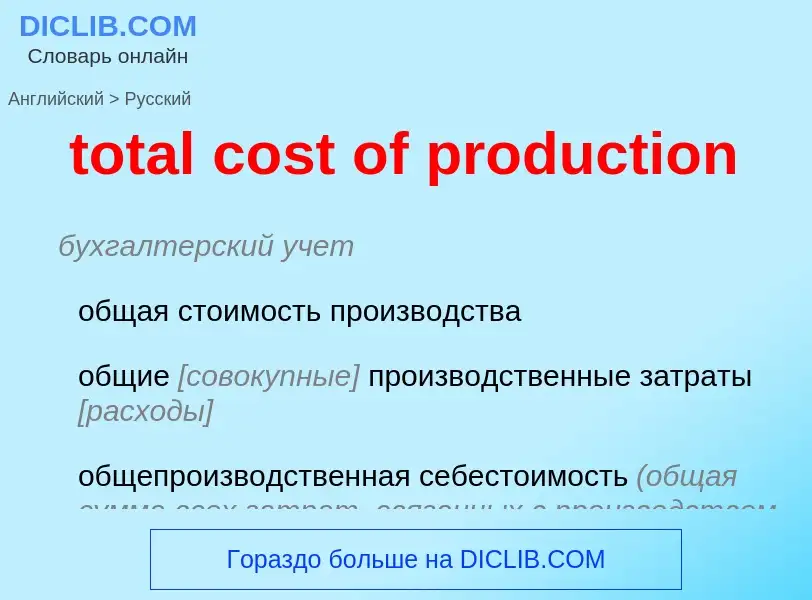Μετάφραση και ανάλυση λέξεων από την τεχνητή νοημοσύνη ChatGPT
Σε αυτήν τη σελίδα μπορείτε να λάβετε μια λεπτομερή ανάλυση μιας λέξης ή μιας φράσης, η οποία δημιουργήθηκε χρησιμοποιώντας το ChatGPT, την καλύτερη τεχνολογία τεχνητής νοημοσύνης μέχρι σήμερα:
- πώς χρησιμοποιείται η λέξη
- συχνότητα χρήσης
- χρησιμοποιείται πιο συχνά στον προφορικό ή γραπτό λόγο
- επιλογές μετάφρασης λέξεων
- παραδείγματα χρήσης (πολλές φράσεις με μετάφραση)
- ετυμολογία
total cost of production - translation to Αγγλικά
бухгалтерский учет
общая стоимость производства
общие [совокупные] производственные затраты [расходы]
общепроизводственная себестоимость (общая сумма всех затрат, связанных с производством конкретной продукции: прямых затрат труда и материалов, а также производственных накладных расходов)
синоним
Смотрите также
экономика
постоянные затраты (затраты, величина которых не изменяется в зависимости от изменения объема производства и которые оплачиваются независимо от того, выпускает ли фирма какой-л. продукт или нет (напр., затраты на аренду зданий и сооружений))
синоним
антоним
Ορισμός
.
Βικιπαίδεια
In accounting and economics, 'fixed costs', also known as indirect costs or overhead costs, are business expenses that are not dependent on the level of goods or services produced by the business. They tend to be recurring, such as interest or rents being paid per month. These costs also tend to be capital costs. This is in contrast to variable costs, which are volume-related (and are paid per quantity produced) and unknown at the beginning of the accounting year. Fixed costs have an effect on the nature of certain variable costs.
For example, a retailer must pay rent and utility bills irrespective of sales. As another example, for a bakery the monthly rent and phone line are fixed costs, irrespective of how much bread is produced and sold; on the other hand, the wages are variable costs, as more workers would need to be hired for the production to increase. For any factory, the fix cost should be all the money paid on capitals and land. Such fixed costs as buying machines and land cannot be not changed no matter how much they produce or even not produce. Raw materials are one of the variable costs, depending on the quantity produced.
Fixed cost are considered an entry barrier for new entrepreneurs. In marketing, it is necessary to know how costs divide between variable and fixed costs. This distinction is crucial in forecasting the earnings generated by various changes in unit sales and thus the financial impact of proposed marketing campaigns. In a survey of nearly 200 senior marketing managers, 60 percent responded that they found the "variable and fixed costs" metric very useful. These costs affect each other and are both extremely important to entrepreneurs.
In economics, there is a fixed cost for a factory in the short run, and the fixed cost is immutable. But in the long run, there are only variable costs, because they control all factors of production.

